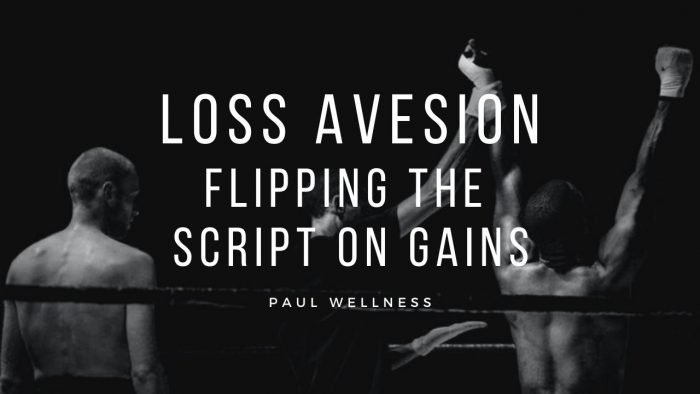We all want to gain something, right? We want to be smarter, stronger, more creative, have more money, and so on. You name it, we want more of it.
But is that really true? Loss aversion suggests the opposite. Most people think their behavior is guided by gaining something, but loss aversion says that we act instead to prevent losses. We put more effort and cognitive focus into preventing losses rather than creating gains. Multiple studies back this up, but it’s still a contested theory.
Today we’ll go over what loss aversion is, ways to implement it into whatever behavior changes you want, and how this can benefit you (yes, that’s a gains-based perspective, but read on and see how it can help!).
What is Loss Aversion?
Let me present a scenario to you.
Let’s say that I run an experiment where you need to press a colored button that corresponds to the right word (ie: blue appears on the screen, push the blue button). Easy enough, right? Now, let’s say that I incentivize the experiment.
In experiment A you gain $0.10 whenever you press the right button, up to $8. In experiment B, I give you $8 at the very beginning, but I take away $0.10 for every wrong answer.
This shouldn’t change anything because you’ll get the same amount of money regardless of how we run the experiment. If you get one wrong in either experiment, then you walk away with $7.90. So this small change of gaining money whenever you press the right button (gains-based behavior) or losing money when you press the wrong button (loss-based behavior) shouldn’t make a difference in your effort or performance.
However, a recent article from Frontiers in Human Neuroscience showed that people expended more effort when there was a loss at stake.
They ran experiments where people had to run to the correct button and one where people simply had to sit and concentrate on the task. In the former, people expended more physical effort to get the correct button when a loss was on the line. In the latter, people were more focused and showed better cognitive abilities when presented with a loss (but only at a high cognitive load, results were similar with easier tasks).
What to Make of Loss Aversion?
Though studies such as this have been debated, this does show that people may be more willing to exert effort in order to avoid a loss. It makes sense when you think about it.
We can look at this in two ways. If you’re at homeostasis, or where you normally are in life, then losses feel awful. Let’s talk about your paycheck. The company you work for is hit with bad economic conditions and now they need to cut paychecks, but only for certain people. Let’s say the maximum loss is 4%. Chances are that you’re willing to fight to reduce that to a 1% or 2% loss.
On the flipside, let’s say you get a fairly standard 4% raise on your paycheck. It feels kind of nice, who doesn’t like getting more money? But it’s pretty standard. You probably aren’t fighting for that raise now and the happiness will wear off quickly after getting the raise.
Another scenario is where you have to actively fight for gains. Let’s take the same example as above, but say that the 4% increase is based on merit. Chances are that you still won’t put in as much effort when compared to losing 4%. You’ll be happy for what you get and will likely feel it’s a just decision (especially if you get the full amount, but if you don’t, then doesn’t that feel like a loss?).
What if Losses and Gains are Repetitive?
Many of us, especially the risk adverse, don’t experience repetitive gains and losses. We might have a considerable gain or loss once or twice a year (such as an annual raise), but that’s about it. That’s not much exposure, so losses can hit very hard if you don’t experience both of these frequently.
But what happens if losses and gains are repetitive? For example, let’s say that you’re an experienced investing trader. The market swings between gains and losses all the time. Or if you’re an experienced athlete and you know that you might lose one game today, but win the next one tomorrow.
Studies are finding that while losses can still sting (especially the big and unexpected ones), they have less of an effect on your effort and cognitive ability. Even still, you might hear the highly seasoned talk about the one that got away or that one loss that stayed with them. The effect might be smaller, but losses can still stay with us.
Building Loss Aversion Into Gains
Going back to the original experiment of pushing buttons and getting a max of $8, both groups effectively gained regardless of the outcome (unless they got everything wrong of course). That means that both gained even if they were focused on gains or losses.
So, how do you build loss aversion into your chosen behavior change? It should really be tailored to your behavior change (weight loss, extra income, making art, etc), but there are a few ideas I can think of. Let me know if any of these work for you.
Also, if you have any ideas, please let me know! I’d love to add more loss aversion techniques here.
Use It or Lose It
Most people focus on gaining something special with their intended behavior change. For example, maybe you want to lose 10lbs to better fit into a wonderful new dress or jeans. You don’t want to buy the special clothes until you achieve your goal (gains-based perspective).
Instead, buy the clothes now and give yourself a specific deadline, like one month. The deadline should be reachable, but short enough to cause some urgency.
What happens if you don’t meet your deadline? Then you return the clothes.
This also works with items that you need to achieve your behavior change. Maybe you need running shoes to run more, but you don’t want to get them until you lose some weight or do more cardio. Instead, buy them now and return them if you don’t run a set number of times in the month.
Hated Charities
This technique comes from Level Up Your Life, by Steve Kamb. It’s a book about gamifying fitness and other healthy behavior changes, turning life into a fun game rather than a boring mix of repetitive actions.
Steve gave a couple hundred bucks to an accountability partner. If he achieved his goal of writing a blog article on time, then the money would stay where it was. If he didn’t and the article was late, then a chunk of that money would go to a charity he hated that supported ideals he was against.
Not only are you losing money, but you’re furthering the goals of an establishment that is against your ideals. That’s a huge loss and one you’re sure to avoid.
Diminishing Gains
Let’s replicate the experiment at the very beginning. Let’s say that you start with one large prize you win at the end of your month if you hit all your goals. Maybe these are cheat days where you can eat whatever you want or a pile of money to spend however you want. The point is to set a maximum amount that you get at the end of the month.
Whenever you don’t hit a smaller weekly goal, you reduce the gains. Let’s say that you get four cheat days, one for each week that you complete your fitness routine. If you get lazy or unmotivated and skip a week, then you lose a cheat day.
You can plug anything you want into this. The point is to have a max goal that reduces if you don’t perform adequately.
Have an Accountability Partner
This isn’t a loss avoidance technique, but rather a supplement to ensure you act on the loss. I know from experience and trying this myself that acting on the loss is tough. I don’t want to give up the item I bought just because I didn’t run enough, and why should I give money to a charity I hate just because my article is a day or two late?
An accountability partner is key to ensuring that you follow through. Make sure this is someone who will follow through for you, and it’s good to have a discussion beforehand about why you want them to do something potentially mean to you (like returning that dress you wanted so much).
Also, don’t get angry at your partner for making sure your losses are real. You asked them to do it, which should improve how well you follow through with your loss-based gains.
Risks of Loss Aversion Techniques
No mental technique is perfect, and loss aversion can be particularly manipulative (even if you’re doing it on yourself). So, before you settle on trying this out for yourself, there are a few warnings I want to give.
Losing Too Much
It’s wonderful to set aggressive goals, and it feels even better when you complete them! However, trying to set very aggressive goals, especially if they are unreasonable, is a terrible idea here.
You’ll go from “I want to try harder next month!” to “I never want to do this again, fitness/business/writing/etc is stupid and I’ve lost so much because of it.” Don’t set the losses so high, and the goals so aggressive, that you end up losing a lot. This is especially true with new behaviors because doing them in the first place is difficult. See our How to Stop Quitting article for more about this.
The losses should be enough to prompt action, but not so dire that you hate engaging in the behavior.
Being Harsh on Yourself
Switching to a loss-based perspective rather than a gains-based one might be able to prompt more action and attention, but it can also change how you see yourself. If you lose too often, then you might start seeing yourself as a loser.
Wanting to do better next month to avoid any losses is fine, that’s exactly what you want! Trying harder to prove you’re not a loser and being highly critical of yourself, that can taint your motivation and personal view of yourself.
Be kind to yourself. Even if you didn’t do well the whole month, be kind and see what you can gain from the experience.
Final Thoughts
Can loss aversion prompt more urgency and effort in your actions? While the results are debated, it seems that many people can stand to gain more from preventing losses rather than seeking out gains. While there are many techniques that you can use to add this to your chosen behavior change, I do want to warn you of being too critical of yourself or hating whatever you’re trying to accomplish.
If you do try this, be sure to be gentle and kind if you do lose. Another recommendation is to make the losses small enough that you can easily walk away, but large enough that they prompt some urgency.
That being said, let me know if this works for you or has worked in the past. I’d also love to hear any other tips you have for flipping the script on gains and utilizing loss aversion in your personal life.


